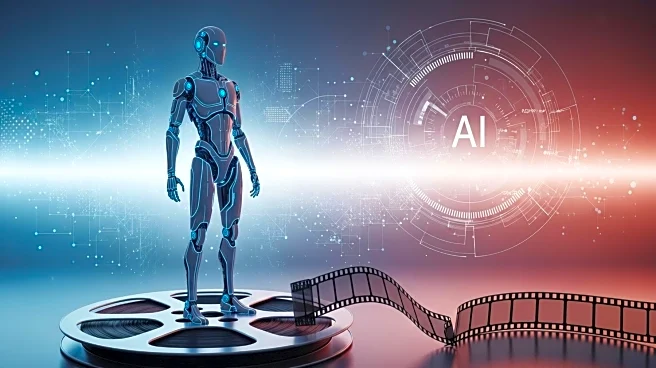What's Happening?
The Toronto International Film Festival (TIFF) has become a battleground for the future of filmmaking, as traditional directors and tech entrepreneurs present contrasting visions. Filmmakers like Richard Linklater, Ethan Hawke, and Guillermo del Toro emphasize the human element in storytelling, while tech companies like Largo, Gennie, and Luma AI advocate for AI-driven production methods. This divide highlights a broader industry debate on the role of AI in film production, with some filmmakers expressing concern over the potential loss of artistic integrity. Meanwhile, tech companies argue that AI can enhance efficiency and creativity in the industry.
Why It's Important?
The integration of AI into filmmaking could significantly impact the industry, potentially altering how films are produced, marketed, and consumed. Traditional filmmakers fear that AI could undermine the artistic process, while tech advocates see it as a tool for innovation and cost reduction. This debate reflects broader societal concerns about AI's role in creative industries and its potential to disrupt traditional practices. The outcome of this debate could influence the future of film production, affecting jobs, artistic expression, and the types of films that reach audiences.
What's Next?
As the industry grapples with these changes, legal battles and negotiations are likely to continue. Companies like Warner Bros. are already taking legal action against AI startups, and settlements like the one involving Anthropic could set precedents for how AI is used in creative fields. Filmmakers and tech companies will need to find common ground to ensure that AI enhances rather than detracts from the art of filmmaking. The industry will also need to address ethical concerns and establish guidelines for AI's role in creative processes.
Beyond the Headlines
The debate over AI in filmmaking raises ethical questions about authorship and the value of human creativity. As AI tools become more sophisticated, the line between human and machine-generated content may blur, challenging traditional notions of originality and ownership. This could lead to a reevaluation of intellectual property laws and the rights of creators in an AI-driven world. Additionally, the cultural impact of AI-generated content on audiences and society at large remains an open question.










